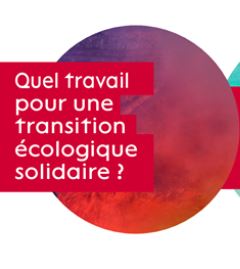Seminar “Work and Ecological Transition”.
Published on May 20, 2019
The environmental (climate, pollution, biodiversity, etc.) and social challenges are highly topical. For two years, RHSF, together with an international group of about thirty social actors (NGOs, associations, social centres, trade unions, church movements, etc.), has been reflecting in a research-action process on the future of work as an integral part of an ecological transition based on solidarity.

On the occasion of the 100th anniversary of the International Labour Organisation (ILO), findings and proposals were shared and enriched during a three-day seminar at UNESCO (20-22 May 2019). Organised with the Centre for Social Research and Action (Ceras), it brought together 70 speakers from all over the world.
RHSF addressed the link between climate change and forced labour, as populations forced to migrate are prey to recruitment agencies and companies that exploit them.
The symposium underlined the urgency of a necessary transformation of the world of work, taking into account invisible workers, future generations and care for the planet. It addressed issues such as the link between social suffering and environmental destruction – the double punishment of workers exploited in polluted environments -, new solidarity-based economies, corporate social and environmental responsibility, the emergence of robotic work, etc. The conference also addressed the need to take into account the role of the private sector in the transformation of the world of work.
Here is the fruit of our joint work:



